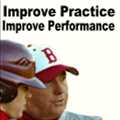Baseball Instruction - The Not So Secret Bunt Defense
By Nate Barnett
Sacrifice bunts are not supposed to be a secret. But somewhere in the entanglement of some (not all) baseball instruction,
the sacrifice bunt became as top secret as the development of the Atomic Bomb. Well... not quite, but you get the idea. What
evidence do I have for this you say?
1. Batters that square around to bunt as the pitcher releases the ball.
2. Runners who get picked off first because they are trying to get a good jump.
3. Improper butting location on the field because of panic to get the bat in the zone.
There is a good start.
I'm saying sacrifice bunting is no secret. In fact, I used to coach a team who had a tough time picking up signs from our
third base coach. So we changed the sign to an audible. It was, "Hey, Johnny, bunt the ball!" We got a few strange looks here
and there but it got the job done. Some great high level baseball instruction, huh.
So if the offense knows it is bunting and the defense knows the offense is bunting, where does the offensive bunt the ball?
Scenario #1: Runner on first base only. No outs (don't bunt with one out please)
The batter squares around to bunt as the pitcher gets into the set position. Now everyone in the park knows. Ah, time to
relax, the rabbit is out of the hat! The batter bunts (strikes only please!) the ball to the first base side of the
diamond.
Why?
Because the first baseman will be holding the runner and will not charge unless it's bunted hard. If he does charge this
means that the second baseman needs to be moving quickly to get to first base. The third baseman will be coming in when the
hitter squares around. Bunting the ball to the third base side is not recommended.
Scenario #2: Runners on first and second base. No outs (don't bunt with one out please)
The batter squares around to bunt again as the pitcher gets into the set position. The batter bunts (strikes only) the
ball to the third base side of the diamond.
Why?
Because the third baseman will be staying close to the bag in the event there is a play there. The first baseman will be
charging as soon as the batter squares to bunt. Bunting the ball down the first base side is not recommended.
And that's it. No top secret baseball instruction, baseball drills, or decoy signs. It's straight up. If the bunter executes
a proper bunt, the sacrifice will be a success.
About the Author
Nate Barnett is owner of BMI Baseball http://bmibaseball.com and is based out of Washington State. His expertise is in
the area of hitting, pitching, and mental training. Coach Barnett's passion is working with youth in helping expand their
vision for their baseball future. After finishing a professional career in the Seattle Mariners Organization, Nate pursued
his coaching and motivational training career. His instructional blog is located at http://bmibaseball.com/blog
His new FREE ebook, Toxic Baseball: Are you polluting your game? can be found on the main BMI Baseball website.
Hitting 101, an ebook on complete hitting mechanics will be released by June 1st, 2008. Features include numerous illustrations,
video clips, and a special offer to discuss your hitting questions over live on the phone strategy sessions.

